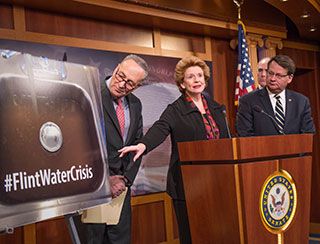
Michigan senators Debbie Stabenow and Gary Peters are joined by fellow senators Chuck Schumer and Bob Casey at a press conference announcing an amendment to the Energy Policy and Modernization Act that would help Flint, Michigan families exposed to lead poisoning through contaminated drinking water. (Image courtesy of Senate Democrats on flickr. License CC BY.)
Instructor(s)
Prof. Christine Walley
MIT Course Number
21A.429J / STS.320J
As Taught In
Fall 2016
Level
Graduate
Course Description
Course Features
Course Description
This course explores the complex interrelationships among humans and natural environments, focusing on non-western parts of the world in addition to Europe and the United States. It uses environmental conflict to draw attention to competing understandings and uses of "nature" as well as the local, national and transnational power relationships in which environmental interactions are embedded. In addition to utilizing a range of theoretical perspectives, this subject draws upon a series of ethnographic case studies of environmental conflicts in various parts of the world.


